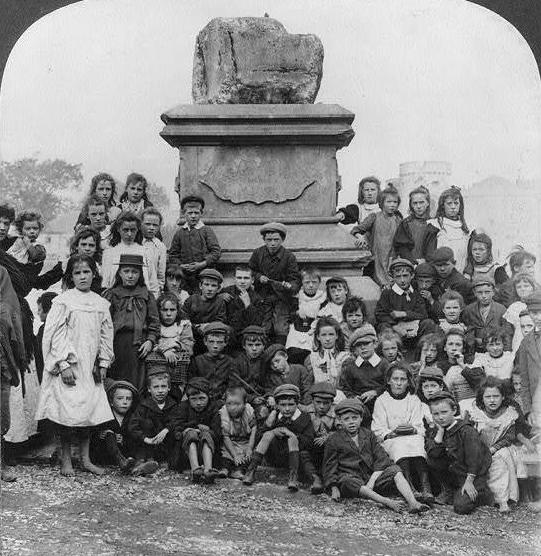
Figure 1.--Here are Limerick primary boys and girls on their playground by famous Treaty Stone of 1691, The photograoph was taken about 1903. Source: American Sterescopic Co. . |

|
The War was formally ended on honorable terms with the Peace of Limrick (1691) Limrick, a port in the southwest, was one of Ireland's most important cties. Patrick Sarsfield captured and destroyed William's convoy of cannons and ammunition en route to support the first siege of Limerick (1690). William again beseiged Limrick (1691). By this time it was clear the the war was lost. Sarsfield was the chief negotiator for the Jacobites. Baron Godert de Ginkel, Eilliam's military commnder, was surprised by the Jacobite request for an aristice. He negotiated on behalf of William. The resulting treaty was a detailed document with both military and civil articles. The military articles primarily addressed how the defeated Jacobite forces would be treated. This was amatter of no small importance. In the wars of the dates there were masacres of both defeated armies and supporting civilian populations. The civil articles were designed to protecting the Jacobites who chose to remain in Ireland. They also set out how Catholics would be treated in an Ireland ruled by a a Protestant monarcy. The military articles permitted Jacobite soldiers to leave Ireland for refuge in France a well as their wives and children. Many chose to do this and this came to be called in Irish history, the 'Flight of the Wild Geese'. Jacobite soldiers wre also permitted to join the Williamite army, but only a few chose to do. The Jacobites who chose to remain in Ireland were prtected as long as they pledged allegiance to King William and Queen Mary. They were allowed to keep their estates and property. Catholic noblemen were also allowed to bear arms. Limerick as a result is known as the Treaty City. The Treaty, according to tradition, was signed on a stone within the sight of both armies at the Clare end of Thomond Bridge. The Irish Parliament subsequently refused to honor many of the terms of the Treaty. The Irish Parliament passed the Penal Laws (mid-1690s). This began the persecution of Irish Catholics in violtion of the Treaty of Limerick.
Navigate the Boys' Historical Clothing Web Site:
[Return to Main Williamite War page]
[Return to Main Irish-English history page]
[Return to Main Irish history page]
[Return to Main 20th century war page]
[Introduction]
[Activities]
[Biographies]
[Chronology]
[Clothing styles]
[Countries]
[Bibliographies]
[Contributions]
[FAQs]
[Glossaries]
[Images]
[Links]
[Registration]
[Tools]
[Boys' Clothing Home]
